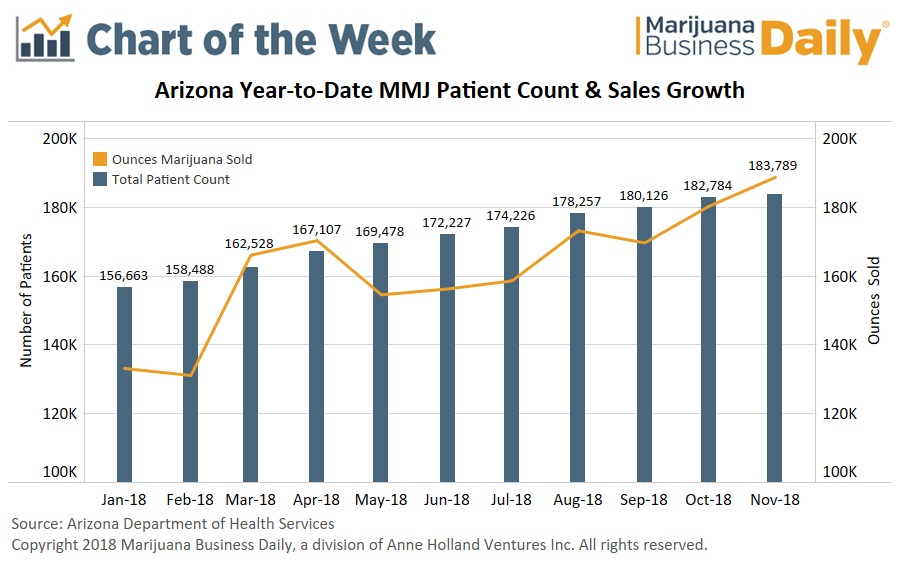Los Angeles picked Cat Packer in 2017 to oversee the city’s cannabis market, considered one of the world’s largest.
Packer – the executive director of L.A.’s Department of Cannabis Regulation (DCR) – spoke with Marijuana Business Daily at the end of November about the city’s regulated market and expectations for 2019.
Many businesses are concerned about the slow transition into the regulated market. What about you?
We’ve made significant progress within the first 11 months, but we have a lot of work to do, and part of it is just the scale of the challenge that is regulating and licensing a consumer product for the first time.
There are lots more desks to be filled. Back on 4/20 of last year, we were a department of four. The first few months I was with the city, we were a department of one.
We’re currently a department of 11 (as of late November), and we have a lot more hiring to do.
There has been this assumption that the city has it all figured out, and the truth is, we’re figuring it out just as the industry is figuring out what these regulations mean.
For licenses to be issued, there has to be a licensing process that’s put in place – and there is – and the department is focused on following that licensing process.
For some operators, it’s almost as if folks are operating in crisis management. So, we try to do our best to engage with stakeholders to let them know that things are going to take time.
We are focused on long-term solutions.
What we’re setting out to do is treat these cannabis businesses just like any other business, and to provide some type of stability.
Do you have an estimate of how many cannabis-related businesses are in L.A.?
I would not be surprised if there were 2,000-plus cannabis businesses.
Traditionally, when folks have tried to capture the number, we often focus on retail. We can go to sites like Weedmaps and see hundreds of businesses offering products.
On our website, we have 169 locations that are authorized to engage in retail operations. Those are the only businesses, aside from about 10 or 11 testing facilities, that we have expressly authorized at this point.
We received close to 600 applications for Phase 2 (licensing back in August and September), but none of those businesses have received express authorization to operate at this point.
We’re still very much in a period of trying to transition our existing market. Outside of testing facilities, we haven’t opened up the process to new applicants.
When can some of the Phase 2 applicants expect to receive licenses?
Businesses who applied in Phase 2 have to meet certain criteria to be deemed eligible for priority processing, including that they existed in the city prior to 2016, that they can show evidence they were an existing supplier to our existing MMJ dispensaries, and they also have to qualify under the social equity program.
Another one of those pieces is passing inspection, which involves DCR and the fire department.
Because our Phase 2 is only for those who are engaged in nonretail activity, we’re going to see cultivators, manufacturers, distributors come in.
And these are folks who absolutely need to go through the fire department before they’re given express authority to operate.
So, you’ll have some businesses that are ready for inspection and meet all the other criteria, and soon after passing an inspection, they’ll get approval.
We have some others that have applied that don’t meet the criteria, so they’re not ever going to get authorization from (their Phase 2 application).
How about Phase 3?
We anticipate starting the annual licensing process in January, but our ordinances require that we give priority in the processing of annual applications to our Phase 1 applicants first, then Phase 2 applicants, and third, we open it up to the general public.
At that point, priority is given to the social equity program participants.
We have this continually evolving timeline, because 169 businesses have to go through the annual licensing process first.
Depending on what Phase 2 shakes out to be with the 600 applications – because not everyone will make it through the process – but say half make it through, we’re looking at close to 475 folks who have to go through annual licensing before we open it up to the general public.
So, we feel comfortable saying the soonest new applicants would be able to submit applications – including those Phase 3 social equity applicants – is sometime in the spring of next year.
Is there a number that DCR would hope to hit in terms of licensed businesses overall?
Demand needs to be met with legal supply.
The city has said it will allow for one retail facility per 10,000 residents. So, with a city of 4 million, we could see close to 400 authorized retail facilities.
That’s not to say the city won’t allow more than 400, but we’ll at least be able to get to 400.
For other types of activity, the city has put soft caps on cultivation and manufacturing.
Those numbers are smaller than 400, so we could see anywhere between 1,200 and 1,800 (total MJ business licenses in L.A.), depending on how things shake out.
There are certain activities that aren’t capped, like delivery, distribution, testing.
For those license types, we really can’t project at this point what the demand is going to look like.
What’s your take on the illicit market rebounding in the past few months and a lack of enforcement?
It’s a real challenge.
We have platforms like Weedmaps that continue to advertise legal and illegal businesses side by side.
The city can do a much better job of (identifying for consumers) who’s lawful and who’s not, so one thing we’re going to do early next year is some type of emblem program (for licensed retailers).
In terms of city enforcement efforts, at DCR we rely very heavily on the police and the city attorney’s office to enforce against illegal operators.
But we’ve been working to reform the city’s enforcement strategy, and that includes trying to shift away from using criminal penalties and toward administrative and civil penalties.
So, we’ve seen council members call for utilities to be disconnected at facilities, or for businesses to be padlocked, fines for employees as opposed to arresting and the traditional raid.
This interview has been edited for length and clarity.
Chris Casacchia is a freelance writer based in Long Beach, California. He can be reached at ccasacchia@hotmail.com.




